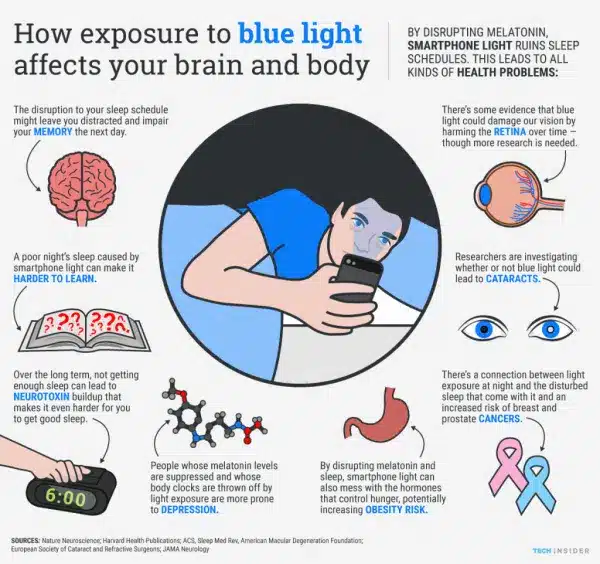Smartphones have become an inseparable part of our lives, offering convenience, connectivity, and endless entertainment.
But as beneficial as they are, the blue light emitted by these devices is wreaking havoc on our brain, body, and sleep cycles.
Studies have shown that prolonged exposure to smartphone light, especially before bedtime, can have far-reaching effects on your health and well-being.
Let’s dive into how this happens, why it’s harmful, and what you can do to minimize the damage.
How Smartphone Light Affects the Brain and Body
1. Disrupts Melatonin Production
- What Happens: The blue light emitted by smartphones suppresses the production of melatonin, the hormone that regulates sleep.
- The Impact: Reduced melatonin levels make it harder to fall asleep and stay asleep, leading to poor sleep quality and fatigue.
2. Interferes with Your Circadian Rhythm
- What Happens: Exposure to artificial light at night tricks your brain into thinking it’s still daytime, disrupting your natural sleep-wake cycle.
- The Impact: This can lead to insomnia, difficulty waking up in the morning, and a general feeling of tiredness throughout the day.
3. Increases Brain Activity
- What Happens: Interacting with your phone—scrolling, texting, or watching videos—stimulates brain activity, making it harder for your mind to wind down.
- The Impact: This heightened alertness delays the onset of sleep, reducing overall sleep duration.
4. Strains Your Eyes
- What Happens: Blue light contributes to digital eye strain, causing symptoms like dry eyes, blurred vision, and headaches.
- The Impact: Prolonged exposure can worsen eye discomfort and further disrupt your ability to relax before bedtime.
5. Contributes to Mental Health Issues
- What Happens: Poor sleep quality caused by smartphone use has been linked to increased anxiety, depression, and stress levels.
- The Impact: This creates a vicious cycle where stress and anxiety further impair sleep, leading to long-term health consequences.
How Smartphone Use Destroys Your Sleep
1. Late-Night Scrolling
The habit of endlessly scrolling through social media or watching videos stimulates your brain and keeps you engaged, delaying your bedtime.
2. Notifications and Alerts
Even if you’re not actively using your phone, notifications, vibrations, or the glow of your screen can interrupt your sleep cycle.
3. Blue Light Exposure
Unlike natural light, the blue light from screens is particularly harmful at night, signaling your brain to stay awake.
Infographic: The Effects of Smartphone Light on Sleep
- Melatonin Suppression: 50% reduction in melatonin production after just 1 hour of smartphone use.
- Sleep Delays: Using a phone before bed can delay sleep onset by up to 1.5 hours.
- Increased Wakefulness: Blue light keeps your brain alert for an extra 30–60 minutes, even after you’ve put the phone away.
How to Minimize the Damage
1. Use Night Mode or Blue Light Filters
- Enable night mode on your phone or use apps that reduce blue light emissions. This adjusts the screen’s color temperature to a warmer tone, reducing its impact on melatonin production.
2. Set a Phone Curfew
- Avoid using your phone at least 1–2 hours before bedtime. Replace this time with relaxing activities like reading a physical book or meditating.
3. Turn Off Notifications
- Silence notifications or put your phone on “Do Not Disturb” mode to prevent interruptions while you sleep.
4. Keep Your Phone Out of the Bedroom
- Charge your phone in another room and use an analog alarm clock instead of your phone to wake up.
5. Invest in Blue Light Blocking Glasses
- These glasses can reduce the effects of blue light exposure, especially if you need to use your phone or other screens at night.
6. Create a Relaxing Evening Routine
- Develop habits that signal your body it’s time to wind down, such as dimming lights, practicing deep breathing, or drinking herbal tea.
Your smartphone is a powerful tool, but it’s important to recognize its impact on your brain, body, and sleep.
By reducing blue light exposure and establishing healthy nighttime habits, you can protect your sleep quality and overall well-being.
Take charge of your sleep health today – share this article with others who might need these tips! A good night’s rest is just a few adjustments away.
